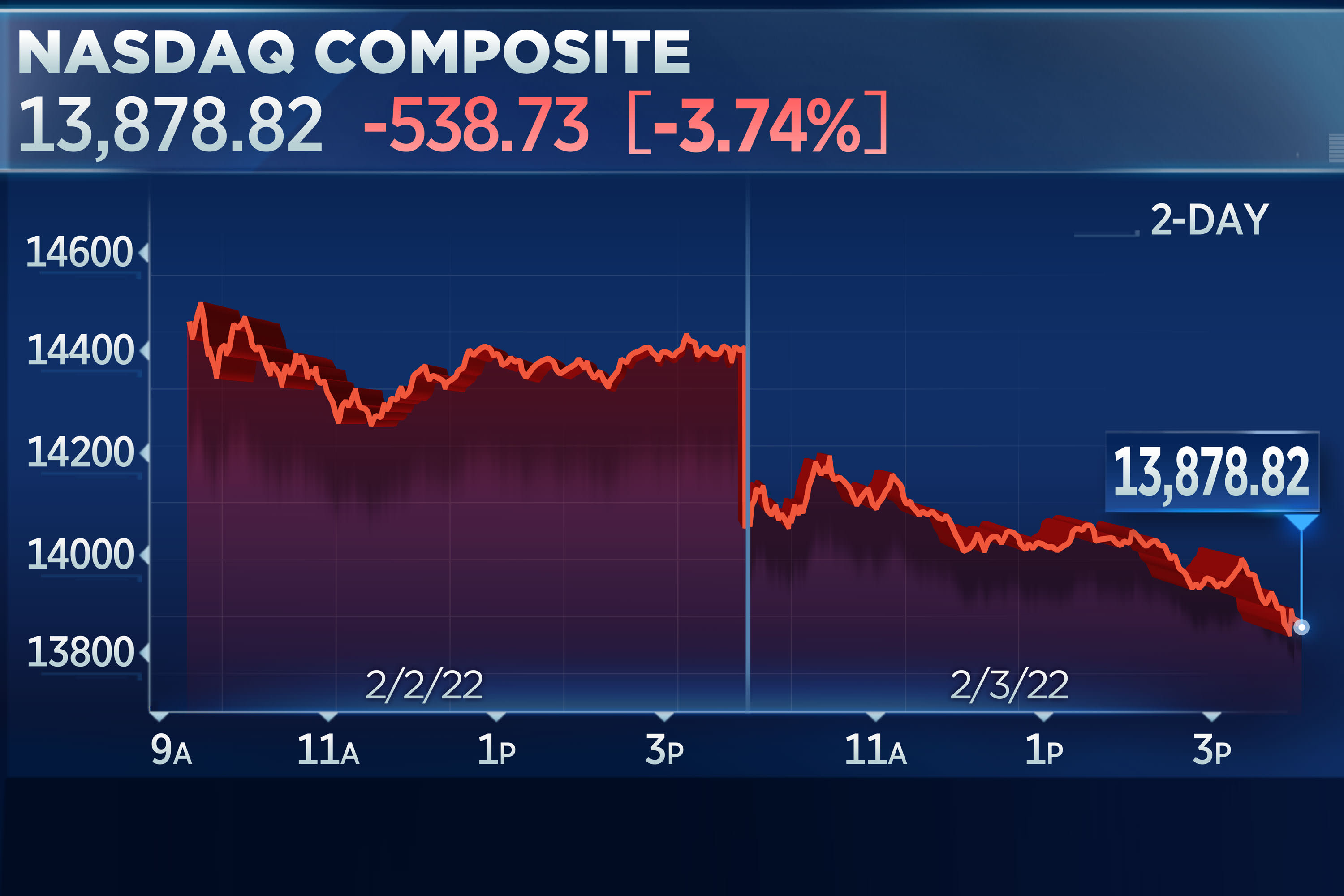
U.S. stocks fell on Thursday as investors’ renewed optimism on big tech names, driven by a slew of strong earnings, took a turn down after Facebook-parent Meta Platforms reported disappointing quarterly results.
Losses deepened by the afternoon, with the Nasdaq Composite falling 3.7% to 13,878.82 for its worst day since September 2020. The S&P 500 had its worst day in nearly a year, sliding 2.4% to 4,477.44, with tech shares as the biggest drag. The Dow Jones Industrial Average fell 518.17 points, or 1.4%, to 35,111.16.
“Facebook is a confidence builder,” said JJ Kinahan, chief market strategist at TD Ameritrade. “It’s a super widely held stock and a core part of many portfolios, so when it has such a difficult time, it just shakes overall confidence. The question right now is, is this a Meta-specific issue, or is this going to be an overall issue?”
Meta Platforms shares plunged 26.4% after the company’s quarterly profit fell short of expectations. The company also issued weaker-than-expected revenue guidance for the current quarter. It was the biggest drop ever for the Facebook parent.
Loading chart…
Other social media names followed Meta lower on Thursday. Snap shares slid 23.6%, and Twitter dropped 5.5%.
Thursday’s declines come after the major averages notched a four-day win streak during the regular session Wednesday, led by Google-parent Alphabet. Investors bought the dip in tech stocks after shedding their positions throughout January as they braced for potential rate hikes from the Federal Reserve.
Strong earnings from Microsoft, Apple and Alphabet drove investors back into tech, reminding them that fundamentals are still strong, but Meta Platforms’ weak guidance has caused some to reverse course.
“The problem we’re suffering from right now for earnings in general is it’s not enough to have good earnings, you have to lay out a really good plan going forward with a lot of optimism. ‘Good isn’t good enough’ is really the theme of this earnings season so far,” Kinahan said.
That heightened bar, Kinahan added, is due in part to the forthcoming Fed rate hikes. This week, tech earnings distracted investors from the central bank’s upcoming moves, but the prospect of policy tightening is still driving the market, he said.
“All assets have a different value than they did,” Kinahan said. “You have this wide range of assumed rate hikes and you’re trying to reprice all these assets based on that assumption, taking into account what they’re saying for future earnings.”
“In the past, if you bought a dip you’d be fine,” he added. “Now, it’s a little bit more of ‘well show me that if I buy the dip, I can be okay.'”
Spotify fell 16.7% after the company’s latest quarterly figures showed a slowdown in premium subscriber growth. Pinterest and Amazon, which will both report earnings after the closing bell, fell 10.3% and 7.8%, respectively.
“We could get another opportunity this afternoon to change the narrative once more,” Kinahan said, noting that investors are expecting Amazon to show record quarterly earnings and revenue.
Outside of tech, Dow component Honeywell’s shares fell 7.6% after the company beat narrowly on profit but fell short on revenue and provided lower-than-expected guidance.
U.S. oil prices topped $90 per barrel for the first time since 2014, adding to concerns about inflation.
On the economic data front, U.S. jobless claims came in at 238,000 for the week ending Jan. 29, the Labor Department reported Thursday, slightly fewer than expected.
Those numbers followed the release of ADP’s surprisingly downbeat private payrolls data Wednesday. Investors are still looking forward to Friday’s release of nonfarm payrolls data. Consensus estimates see a gain of 150,000 jobs, according to Dow Jones, but Wall Street forecasters say the actual tally will be far lower, with one estimating a loss of 400,000 jobs in January.
The 10-year U.S. Treasury yield gained in anticipation of Friday’s data, adding to the pain in tech stocks.
In central bank news, the Bank of England announced a quarter-percentage-point interest rate increase, while the European Central Bank held the line on its benchmark rate despite inflation in the euro zone rising to a new record.
Subscribe to CNBC PRO for exclusive insights and analysis, and live business day programming from around the world.



